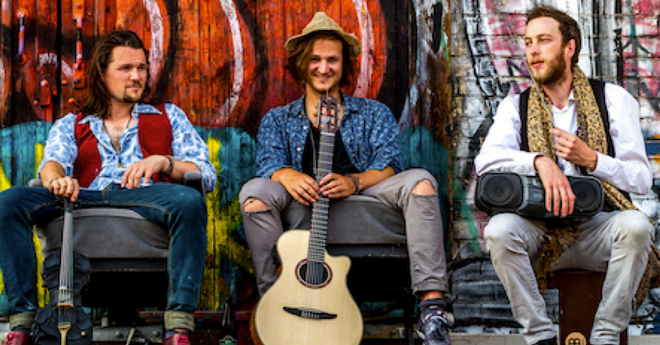
Interviews
The Trouble Notes – Live in Berlin
By: Jamie Steinberg
Q) How would you describe your sound?
A) In short, we call it “World Fusion,” but to put a label on our music is very difficult. Traveling is a big passion of ours and mixing different cultures and traditions into our music helps keep that spirit alive. Sometimes we feel that our music is a way of communication emotions and experiences that are difficult to put into words. It’s as if that universal language of music helps us to convey messages that our own native tongues are unable to express.
Q) Who are some of your musical influences?
A) We’re all over the place with where we draw inspiration. One place we always look is different traditional music styles from the places we visit – that’s how we soak up our cultural sounds. Some of our favorite groups are Rodrigo y Gabriela, Muse, Django & Stephane Grapelli, Nirvana and Gogol Bordello.
Q) Talk about the story behind your new song “Grand Masquerade.”
A) Often individuals find it necessary to mask who they are from the world in attempts to fit in and conform to the norms of society or pressures of an oppressive government or household. The song focuses on that figurative mask that people create for themselves to hide true feelings from friends, family or society for fear of the consequences of revealing their true face. The song highlights the struggle of self-grappling with the decision to live a life of masked conformity or defiant individualism.
Q) What do you think it is about the song that fans connect to?
A) That story is very relatable for us all. The emotions behind this song resonate with everyone who hears it. When the video of us playing this song went viral last year, we were moved by all of the feedback on the composition itself – our intentions were transporting through the video. It’s truly surreal for us the connection we’ve made with so many people because of this song.
Q) How does the video for the track play into the message behind it?
A) There are two videos for the song, one which plays directly into the message behind the song and another which puts the focus more on us as performers. The most recent video that we released earlier this month was filmed in France by some very talented videographer friends of ours who found us through that song. So, it was fitting that it should be the basis for the video we made together. Stephan and Fabien understood the song very well and the shots and final edit captures the emotions behind the notes.
Q) What is your song writing process? Do you need music before you can create lyrics?
A) Our music remains instrumental. Usually it starts with a melody. Depending on where the melody first manifests or which direction we want to take the song, we start to adapt and mold the rhythm and harmonies to give a cultural atmosphere. Producing music without lyrics maintains a wider scope, thus allowing our audience to inject themselves in the music.
Q) How much of hand do you have in the production of your music?
A) We write and produce the music almost exclusively ourselves. Most of the songs are written while traveling and we draw influence from the local cultures. The exception is our studio album Lose Your Ties, where we worked with producer Khalil Chahine to enhance some of the cultural nuances of our music. He worked with us to share a vision for each song and try to expand on some of the traditional themes in our music.
Q) You are currently on a US tour. What can fans expect from a live The Trouble Notes performance?
A) One thing you are sure to get at one of our shows is energy and passion. We want to take the audience with us on a journey around the world. We sometimes joke that it will be the cheapest vacation one could ever take!
Q) What songs off your live album do you truly enjoy performing live?
A) Very difficult to single out just one song because we truly love our music. That said, each of us have our favorites, but that often depends on the setting because we draw so much influence from our audience. Songs like “Barney Rubble,” “Fiodoir” and “Gypsy Train” are suited for energetic “dancing” audiences, while songs like “Grand Masquerade,” “Ghosts of the Red Sand” and “Christoph” are more cerebral and thought provoking.
Q) What do you hope listeners take away from listening to your music as a whole?
A) We want our music to be a kind of bridge between cultures. Our goal is to expose our audiences to “new” things by presenting cultural music in a familiar prose. The “hope” is to have our audience leave more open for new experiences and understanding. We want them to experience a culture and think, “If I like the music from that place, perhaps there are other things from that place I would enjoy as well.” This is a very real way that art could help foster greater understanding between people.
Q) Where are some of your favorite places to perform and what makes those locations so significant to you?
A) Street music remains a big part of our musical identity. While we do not play in the streets so often anymore these days, we still try and take advantage of the opportunity whenever we find ourselves in the right place. There are places on this earth that were MADE for street music, especially some of the squares and public spaces in European cities. The acoustics are unique and the history oozes from the walls, which inspires an even better performance. The cathedral place in Strasbourg, Cologne, Old Town Square in Prague, Berlin’s Mauerpark Ampitheater and Central Park in New York City come to mind almost immediately. We have had magical busking experiences nearly everywhere we go – we just keep an open mind and are always prepared to drop our case when the energy feels right!
Q) Who would you most like to collaborate with on a song in the future?
A) It is difficult to select just one person. We love to work with great instrumentalists, particularly those who have a unique voice and perspective – also those with a history of performing in the streets. As a musical mind, Stromae has always been someone we have great respect for. Producers like Worakls and Joachim Pastore are also very interesting for their take on electronic music and use of instruments. Also, MCs like Yelawolf, Lupe Fiasco, Common, and Marlon Craft – who have style and a message/
Q) What album/band are you currently listening to and why do you dig them?
A) We had a live album from Rising Appalachia on repeat in our tour van for a month or so before we left Europe for this tour. We played a few shows together in Germany while they were in Europe touring and really connected with their music. There are some styles and elements that they use in their music that can be influential in some of our future compositions.
Q) You are a part of social media. Why is that such an important way for you to connect with your fans?
A) Social media is a big part of our identity because we are able to connect directly with our fans. If you spend more than a few seconds with us, you’ll realize we are very “real.” The fact that someone connects with our music still humbles us and we want to know more about who that resonates with and why. Our fans motivate us, they share their stories and we share ours. Some of our new music is directly influenced by them, their stories and their passions. That started from the first day we started playing music in the street and our social media accounts have allowed us to amplify that connection.
Q) What would you like to say to everyone who is a fan and supporter of you and your work?
A) We love you. We are truly appreciative of your support and continue to use your feedback as fuel for our energy. Every success we have we owe to you and for as long as you continue to support us, we will continue to play and create for you. Thank you for being a part of our Trouble Family.





You must be logged in to post a comment Login